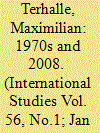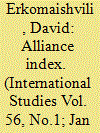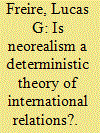|
|
|
Sort Order |
|
|
|
Items / Page
|
|
|
|
|
|
|
| Srl | Item |
| 1 |
ID:
166024


|
|
|
|
|
| Summary/Abstract |
Many Western and non-Western scholars consider the 2008 financial crisis a fundamental caesura, precipitating a decentred globalism. However, they have neither conceptualized the foundations of the dynamics that developed before this caesura nor have they theorized the amalgamating process which ultimately merged the hitherto overlooked and the formerly predominant Western forces and actors. Addressing this deficit, this article presents two innovations. First, it re-conceptualizes the 1970s by integrating two macro-developments: China’s deviation from patterns of the former Third World’s development and the thickening of liberal politico-economic institutions. Their relationship was complementary, but independent, since heterogeneous purposes drove these strands. Neither was disrupted by the end of bipolarity. Thereby, this article offers the first narrative of the years 1970–2008, viewing them as the incubation period of both strands’ simultaneous development before their fusion in ‘decentred globalism’. Consequently, the 1970s supersede International Relations (IR’s) hegemonic benchmark date of 1989–1991. Second, the article accounts for the merging of macro-developments. It argues that, despite regularities, international social life is characterized by heterogeneous purposes derived from different social contexts, reflecting an environment that operates in multidirectional ways. Large trends in the environment, such as those of the 1970s, may coincide at contingent points in time (e.g., 2008). Based on comprehensive reviews of distinct literatures, these two innovations emerge as the key building blocks for the development of a theory of benchmark dates for a ‘decentred’ global order.
|
|
|
|
|
|
|
|
|
|
|
|
|
|
|
|
| 2 |
ID:
166025


|
|
|
|
|
| Summary/Abstract |
Orthodox approaches developed by Alliance Theory to study alliances are characterized by static and state-centric focus, which exposes theory’s logical limitations. In contrast, modern alignments are marked by continuous oscillations. Alignment stability—according to orthodox Alliance Theory—may be altogether misleading for the explanation of behaviour in alignment. This article theoretically re-conceptualizes the key notion of the orthodox Alliance Theory—the concept of alliance. Building on the basis of isolated but significant fragments of advanced research, the theoretical essence of the Alliance Theory is adjusted to encompass alignment process. Importantly, such a re-calibration bears in on an overlooked element common to all alignments—fluidity. Theoretical modification resulted in two important outcomes. First, the change of the vantage point in explaining alignments theoretically extends the orthodox Alliance Theory’s traditionally limited applicability, which excluded subnational and non-state actors. Second, the change allowed reviewing the essence of alignments focusing on a persistently evolving process, rather than on alignments’ institutional image. Sustained realignment, upgrading or downgrading of cooperative relations between actors and concurrent alignment to rival parties is no more confusing in explaining alignments. The article develops an alignment index and calculates it for the post-Soviet space.
|
|
|
|
|
|
|
|
|
|
|
|
|
|
|
|
| 3 |
ID:
166027


|
|
|
|
|
| Summary/Abstract |
This article is a contribution to the clarification of the central claim of Kenneth Waltz’s neorealist international relations theory. Over the years, the notion that Waltz’s Theory of International Politics postulates a deterministic connection between the configuration of the structure of the international system and the behaviour of each of the units has gained traction in textbooks and in straw-man critiques of the neorealist approach. Two major groups of critics of neorealism’s alleged determinism have formed. The first group focuses on instances where predicted balancing behaviour did not occur in order to refute neorealism’s central claim about the link between structure and behaviour. The second group objects to any strong claims about structural features as such. In response, this article shows that a careful reading of Waltz’s writings suffices to indicate that the presupposition adopted by both groups of critics is flawed. Neorealism was never presented by its main proponent as a deterministic international relations theory.
|
|
|
|
|
|
|
|
|
|
|
|
|
|
|
|
| 4 |
ID:
166026


|
|
|
|
|
| Summary/Abstract |
This article presents select data, recent trends and empirical analysis concerning American voters’ attitudes on American foreign policy in the Trump era. Accordingly, it addresses several vital questions: (a) whether and to what extent Trump Republicans hold views that are distinct from non-Trump Republicans and from average US voters?; (b) how widespread is support for President Trump’s foreign policy?; and (c) whether partisanship has intensified? Importantly, the study deduces preliminary theoretical observations and highlights select new pathways for future research. The key findings of the article are: (a) Trump supporters hold distinct views from the general public; (b) President Trump’s positions are not popular; (c) partisanship has intensified under Trump; (d) on the broad contours of American foreign policy, the American public, including the non-Trump Republicans, express noteworthy continuity, stability and support in spite of a deeply polarizing American president. The article offers select theoretical insights, including recognition of the role of core value in ordering belief systems, thereby offering a modicum of internal coherence, stability and structure to foreign policy views of American mass public, thus transcending the traditional Almond–Lippmann theoretical consensus regarding the content of American public opinion.
|
|
|
|
|
|
|
|
|
|
|
|
|
|
|
|
|
|
|
|
|